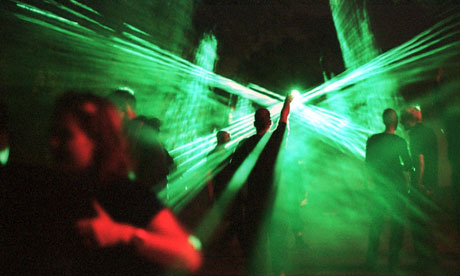
Historically, dance music has had a number of focal points (Detroit, Ibiza, Manchester, Ayia Napa, New York), but nothing, I'd argue, quite like Berlin. For a decade now, the city has been both the totemic and actual centre of electronic music, internationally. The city has produced both extraordinary music and incubated the club scene where that music is best enjoyed. Moreover, its energy is growing exponentially. Each plane that lands at Schönefeld brings fresh migrant musical talent to this "poor but sexy" city. All of them determined, not so much to make their mark on Berlin, as use the city as a space in which to explore their creative urges free of commercial pressure.
Cheap rent is just one attraction. Equally important is the way that, as a city, Berlin cleaves, self-consciously, to underground principles. It is seen as deeply uncool to brashly promote yourself, commercialise your art, or chase the money, and Berlin's clubs are products of that ethos.
Yes, they are businesses, but they do not exploit their regulars. Most operate in a free-to-€12 price band which, even at the higher-end, is often great value for the line-ups and midnight-to-midday opening hours. Compared to other European cities, drinks are cheap, and there is none of the brand-diversification that came to define the UK's bloated "superclubs". Berghain may run a (very good) record label and sell (rather naff) T-shirts, but compare its enigmatic media silence and its spin-off art projects, to club supermarkets such as Cream or Ministry of Sound.
Berlin's club owners, it seems, are enthusiasts. They love techno. How else to explain, for instance, the quality of the club sound-systems in Berlin? Last time I was out there, in May, I found myself dancing on consecutive nights in the relatively swanky My Name Is Barbarella and, at a free party, in a "garten" (actually, a patch of graffiti-tagged wasteground), next to :vorWien. At both, the sound was fantastic.
But, then, Berlin is a city that takes its music seriously. Not so seriously that there aren't daft communal "moments" in Berlin's clubs – I've enjoyed rousing, massed sing-a-longs to both Depeche Mode and, erm, INXS, in Watergate; the crowd getting carried away as the sun rises over the Spree - but it is also the city where uncompromising pioneer Moritz Von Oswald is afforded elder-statesmen status; where you might find techno godhead Villalobos spinning experimental ambient music in his spare time; where balding brass-techno duo, Die Vogel, are warmly embraced; and austere Dettmann-ish dub-techno fills dancefloors. On excellent local station, Motor FM, you will hear Sonic Youth next to the latest Innervisions release.
That sense of freedom is palpable in the clubs, too. The ungodly hours they stay open (on my first visit to Berlin, I ended up listening to brutal drill 'n' bass in Tresor at 4pm, on a Thursday afternoon) is less important than their easygoing, egalitarian atmosphere. There are no VIP areas. No ostentatious cliques. No dress codes (Berlin dresses down). No snarling bouncers roaming dancefloors. Quite the opposite. I've seem some pretty outrageous things going on in Berlin clubs – and I don't mean down in Berghain's "dark rooms". Yet – sadly, I didn't witness this – the only time I have ever seen anyone thrown-out was for taking photos. How can you not love a city where invading people's privacy is considered more offensive than acts which, elsewhere, would outrage public decency?
That this all takes place in a venues that are either visually stunning (the rooftop terrace at Weekend; Watergate and its mesmeric ceiling; former power-station-cum-techno-cathedral, Berghain), or interesting, ramshackle spaces that would never pass health and safety in the UK (Bar25, RIP; the strung-together pontoons on the Landwehr canal at Club Der Visionaere; the remnants of the Tacheles squat), peopled by clubbers of all backgrounds, sexualities, nationalities and ages, is all deeply seductive. To be 40 and still on the dancefloor in Berlin is nothing. As a piece of graffiti outside Berghain reminds everyone: "Don't forget to go home."
Can anywhere else come close? I worked for Manumission in Ibiza, in 1995 (no, not in the sex show) and I've only been back once, since. The island is more musically adventurous these days, but, for me, Ibiza still gives off a very Hollyoaks vibe. It's for people who feel confident dancing on a beach in a bikini. Berlin is full of dysfunctional weirdoes.
New York, the odd party apart, still seems like it hasn't recovered from Giuliani. Is that true? Likewise, if for different reasons, Buenos Aires is described as not being the party city it once was. Would you agree?
From Kazantip to 10 Days Off in Ghent, I could point towards one-off events and individual clubs which share something of Berlin's spirit. But, as with Hamburg (which has its own distinct house music scene); Toronto's vibrant electronic music underground; Manchester's growing network of grimy, leftfield club spaces; or Oslo's influence in gifting nu disco to the world, none of these are phenomena which define their respective cities in the way that clubbing and techno does Berlin.
London is the only place that comes close. Where Berlin has techno, London has bass music and, in each city, the nightlife is extraordinarily variegated and fertile. Still, given the choice of paying £20 to get into Fabric on a Saturday night, or running the gauntlet that is Berghain's supposedly capricious door policy (useful tip: don't be an idiot), I know where I'd rather be. You?

